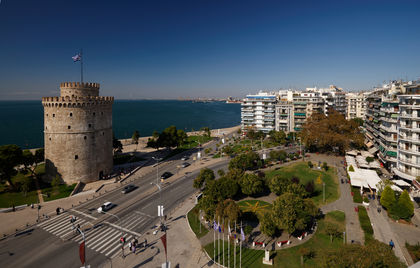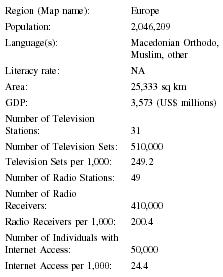Macedonia

Basic Data
| Official Country Name: | The Former Yugoslav Republic of Macedonia |

| Region (Map name): | Europe |
| Population: | 2,046,209 |
| Language(s): | Macedonian Orthodo, Muslim, other |
| Literacy rate: | NA |
| Area: | 25,333 sq km |
| GDP: | 3,573 (US$ millions) |
| Number of Television Stations: | 31 |
| Number of Television Sets: | 510,000 |
| Television Sets per 1,000: | 249.2 |
| Number of Radio Stations: | 49 |
| Number of Radio Receivers: | 410,000 |
| Radio Receivers per 1,000: | 200.4 |
| Number of Individuals with Internet Access: | 50,000 |
| Internet Access per 1,000: | 24.4 |
The media scene in Macedonia livened up within a few years after the country declared its independence from Yugoslavia in 1991 and commenced a double transition toward democracy and capitalism. Media outlets started to compete for the attention of a literate (94 percent) and multi-ethnic audience, hungry for respite from the propaganda humdrum in the communist-ruled Yugoslavia. Hundreds of private newspapers and magazines emerged, and some 250 private broadcasters took to the air.
The promise for a quick transition to Western-style free press in Macedonia has been since dampened. The media scene is still much livelier than during the Yugoslav period, but it has suffered from government interference, political and ethnic biases of publications, a malfunctioning economy, and uneven and often poor quality of journalism. Plagued by high unemployment and decline in living standards, Macedonia endured series of economic, political and social crises during the 1990s. It is hardly surprising that media have been preoccupied with issues of security and politics.
The Ministry of Information listed 818 officially registered newspapers and magazines as of June 2000, but the actual number is considerably smaller. Of those, 51 are published in Albanian language, 6 in Turkish, 4 in Vlachian, 3 in Romany (Roma), 2 in Bosnian, and 5 in English. More than 600 publications are based in Skopje.
In March 2000 Macedonia had 11 dailies, 2 in Albanian and 1 in Turkish. Most popular by circulation are: Dnevnik (daily 60,000; weekend 70,000), Ve&NA;er (50,000), Utrinski Vesnik (30,000), Vest (25,000), Nova Makedonija (20,000), Denes (15,000), SportFakti (10,000), and Flaka (3,000). The independent Dnevnik is considered to be the most influential newspaper, and Nova Makedonija has traditionally been the voice of the government. Most newspapers are losing money.
The government owns one third of NIP Nova Make-donija, publisher of Nova Makedonija and Ve&NA;er , as well as the weekly Puls , the Albanian-language daily Flaka , and the Turkish-language Birlik , which comes out three times a week. All other print media in Macedonia are private.
Fokus (12,000), Start (10,000), and Denes (7,500) are the most important weekly political magazines. Macedonia has a lucrative but limited market for entertainment weeklies, such as Kotelec (15,000), Ekran (9,500), and TEA (7,500). The biweekly political magazine Forum (6,000) is also influential and profitable and, along with Fokus , charges the highest rates for advertising in print media.
Three television channels—the state-owned Macedonian Television (MTV) and private A1 TV and Sitel TV—provide national coverage. Only MTV, broadcasting since 1966, has full 24-hour programming. A1 TV has a program split similar to MTV with about one fifth of its programming devoted to news, whereas Sitel TV is more entertainment-and sports-oriented.
The state-owned Macedonian Radio and private Kanal 77 have national radio coverage. There is a large number of local private stations, so many towns have at least one station; most are entertainment-oriented.
The multiethnic populace requires special program considerations, and MTV first broadcast in Albanian in 1967 and in Turkish in 1969. MTV maintains three hours of daily programming in Albanian (MTV-PA) and 90 minute of programming in Turkish. Similarly, Macedonian Radio has eight hours of daily programming in Albanian and five hours in Turkish.
Dozens of unlicensed, pirate radio and television stations operate locally without paying any fees and violating copyright laws. The government's efforts to enforce the regulations have been inconsistent.
Macedonia's principal information agencies are the government-owned Macedonian Information Agency and private Makfaks.
Article 16 of the Constitution guarantees freedom of speech and access to information and forbids censorship. Instances of media suppression are still reported, although direct government involvement seems to be limited to crisis situations. For example, the 2001 ethnic Albanian insurgency precipitated a government crack-down on Albanian-language TV and radio programs, including the suspension of broadcasts for several days. Police also limited journalists' access to conflict areas, and ethnic-Albanian journalists complained of harassment.
Newspapers and magazines must register with the Ministry of Information according to a 1976 statute. Broadcast media are regulated by the Law on Broadcast Activity, adopted in 1997. The Broadcasting Council, whose members are selected by the parliament, disburses broadcast licenses. The government, however, gives the final approval and thus exerts a measure of control. A proposed draft law on public information in 2001 caused outcry from media organizations, as it intended to introduce licensing for local journalists and registration for foreign correspondents.
Political parties in power can manipulate the media by allocating advertising and ensuring income for some media and none for others. Political and business affiliations of owners also greatly influence the coverage and staffing decisions.
Although primarily a formality, distributors of foreign newspapers and magazines must obtain permits from the Ministry of Interior. Foreign media are readily available, especially in Skopje, but prices of Western print media are usually prohibitive for most Macedonians.
Broadcast programs from neighboring countries can be received in the border areas. Macedonia does not restrict individual Internet users, although the computer ownership is not particularly high because of its costs. Internet cafes are quickly becoming the alternative to home-based Internet. Most major media outlets maintain Web sites.
The Macedonian media has been polarized along ethnic lines, which has hurt the objectivity of reporting. With the allayment of ethnic tensions the quality of journalism can be expected to improve. Yet Macedonia's media faces a credibility problem. The public's trust in the media is generally low, especially among ethnic Albanians, and surveys indicate that a majority of the population believes news media serve the interests of powerful people and organizations.
Bibliography
Country Reports on Human Rights Practices 2001: Macedonia . Washington, DC: U.S. Department of State, 2002.
Human Development Report 2001 . New York: United Nations Development Program, 2002.
Macedonia: Press Overview . International Journalists Network, 2002. Available from http://www.ijnet.org .

The Mass Media in the Republic of Macedonia . Skopje: Agency of Information, Ministry of Information, 2001.
Media Overview: Macedonia, 2000 . Vienna, Austria: GfK, Austria, 2001.
Media Monitoring in Macedonia, 2002 . Düsseldorf: European Institute for Media. Available from www.eim.org .
Naegele, Jolyon. "Macedonia: News Media Under Fire for Poor Reporting, Government Manipulation." RFERL Newsline, May 3, 2002. Available from www.rferl.org .
Nations in Transit: 1999/2000 . Washington, DC: Freedom House, 2000.
Republic of Macedonia Statistical Yearbook 2000 . Skopje: National Statistical Office, 2001.
Sopar, Vesna, and Emilija Jovanova. "The Media System in the Republic of Macedonia: Broadcasting between the Normative and the Real." Media Online/Media Plan, June 12, 2000. Available from www.mediaonline.ba .
Turner, Barry, ed. The Statesman's Yearbook 2002 . New York: Palgrave, 2001.
Christopher D. Karadjov
Comment about this article, ask questions, or add new information about this topic: